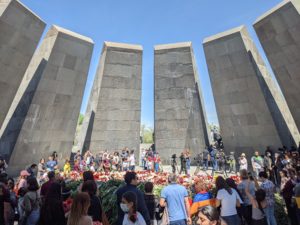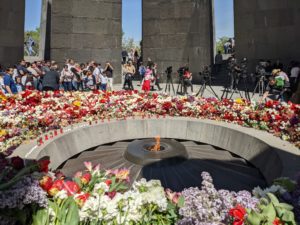Yerevan – Thousands of Armenians, young and old, walked up the mountainside on April 24 to where the genocide memorial sits overlooking the capital. There they placed flowers at the eternal flame as part of a ceremony for the Armenian Genocide Remembrance Day. Even as they engage in this tradition, there is a sense that this year is different. COVID-19 kept thousands of diaspora visitors from making the journey to be here, and the recent conflict is a fresh reminder that Armenia still faces security risks. It is also different because President Joe Biden formally recognized the Armenian Genocide, making him the first president to formally use the word genocide in connection to what happened to the Armenian community.
Armenians, from officials to the man on the street, have been cautious about being too optimistic. One person told me, “We’ve been lied to before,” and another said, “I guess we’ll see in two days.” The sense of abandonment is strong for Armenians who feel the international community was deafeningly silent in the face of recent Azerbaijan aggression. “We were forgotten,” one man told me. That recent trauma woke their historic memory of the genocide as their adversaries, Azerbaijan and its supporter Turkey, continue to act and sound more and more like the Ottoman Empire that perpetrated the 1915 genocide.
When asked what President Biden’s genocide recognition will mean to Armenians, they are quick to answer that it is critical for historical justice. But what the recognition will lead to is most important. Using the word genocide is important to counter the state policies of genocide denial held by some of their neighbors. Even more so, they want the world to view the 1915 genocide with a level of seriousness they feel it has never received, especially when held in comparison to international cultural awareness of the Holocaust, for which the Armenian Genocide was the blueprint. Globally, 70 major museums are dedicated to the Holocaust; for the Armenian Genocide, there are only three, a fact of which Armenian scholars are painfully conscious.
For Armenians, America’s unwillingness to recognize the genocide for many years was made worse by the fact that the United States was one of the countries that responded to the genocide most robustly at the time. Henry Morgenthau, the US ambassador in Istanbul in 1915, reported the appalling events of the genocide to Washington regularly and delivered an unequivocal condemnation of the genocide to the Turkish government from US Secretary of State William Jennings Bryan. Congress founded the Near East Relief committee in 1919, launching a public-private partnership to provide aid to orphans and other genocide victims. Woodrow Wilson even proposed to Congress that the US accept the creation of an Armenian state under a US mandate. An isolationist-minded Senate rejected this idea. The US policy in later years of not using the word genocide to avoid angering Turkey has been deeply hurtful to Armenians. One told me, “We just want the US to act like a world leader.”
For 50 years after the genocide, the Soviet Union did not allow Armenians to speak or write much about the genocide, an existential trauma they had just narrowly survived. Only in 1965 did they allow the genocide memorial’s construction in Yerevan. Not until the fall of the Soviet Union and the establishment of the Republic of Armenia could Armenians open a museum to teach visitors and young people their history.
In Armenia, a popular slogan in reference to the genocide is, “We remember, we demand.” While there is not an official list of demands, they would like the international community and the United States to do many tangible things.
While in Yerevan, I had the pleasure of meeting with the director of the Memorial Museum-Institute, Harutyan Marutyan. He kindly shared with me his attempt to quantify what Armenians mean when they say, “We demand.” While the government of the Republic of Armenia has no official position on genocide restitution, the “Pan-Armenian Declaration on the Centennial of the Armenian Genocide,” which was adopted by a government commission on the genocide’s 100th anniversary, provides some idea. Half of the declaration’s 12 articles focus on the genocide, but the others suggest that ensuring the rights of Armenians, ending the blockage of the republic by Turkey, ending the Turkish state policy of genocide denial, and eliminating “the consequences of the Genocide” are elements necessary to restoration.
If these seem like ambitious objectives, they are.
Marutyan shared this quotation of former Armenian ambassador to Canada, Ara Papian:
The real purpose of resolving the Armenian Question is to create a sustainable state through the minimal requirements necessary for security and development… Without resolving the Armenian Question, Armenian statehood will remain politically unstable, militarily vulnerable, economically dependent, and psychologically timid.
There is a striking yet not surprising similarity to the desire of the Jewish people to have a place of their own to flourish without feeling threatened after the Holocaust. For Armenians, the recognition of the genocide suggests that with the admission some corrective action is required in response to the injustice that occurred. Whether that will follow President Biden’s announcement remains to be seen. For them, the health and security of the Republic of Armenia are inseparable from the trauma of the genocide.
My taxi driver bringing me to lay flowers at the Genocide Memorial asked if I was American. When I affirmed that I was, he flashed a big thumbs up and said, “Oh Biden, Love Biden!” Hopefully, for now, Armenians will feel remembered by the United States.









 Sponsor a student for Christianity & National Security 2024
Sponsor a student for Christianity & National Security 2024